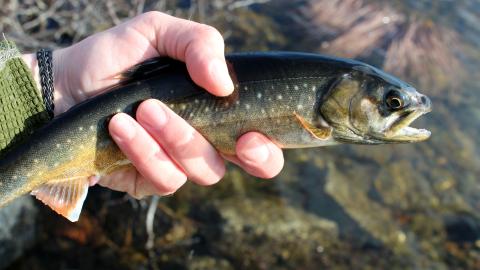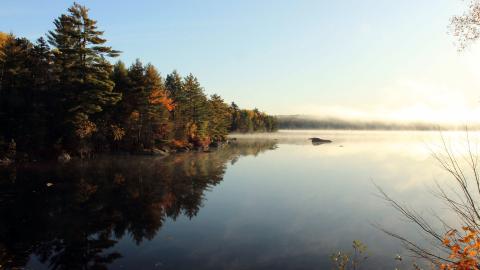About the UNH Researcher

Nathan Furey, assistant professor, Biological Sciences; the Nathan B. Furey Fish and Movement Ecology Lab
Contact information: Nathan.Furey@unh.edu, 603-862-0675
This research was recently funded through a grant from the National Science Foundation.
Researchers: N. Furey, M. Kinnson and C. Murphy
As climate warms, lake ecosystems are changing. A challenge is identifying which animals and systems are most vulnerable, or conversely most resilient, to continued climate change. In the state of Maine, there are 13 populations of Arctic charr, representing the most southern populations of this cold-adapted and iconic fish. Which populations of charr that are most likely to persist in the face of climate change is likely dependent on how individual fish behave and feed, and their ability to shift their diets to match changing ecosystems.
Study details
This study investigates four of these charr-bearing lakes in Maine to determine how their habitat and food webs differ, and how this relates to specific Arctic charr behaviors and feeding traits. Acoustic telemetry tags (electronic transmitters that emit unique sound signals) will track the movements of individual charr at fine scales in Floods Pond, Maine. In this system, there are 20 years of genetic samples that will help determine how charr traits might change through time and be linked to survival. Mathematical models will be used to predict how differences in diet and habitat among charr-bearing lakes may affect charr, their population productivity, and subsequently the resilience of this fish to continued warming and changes in habitats.
Arctic charr are of extreme conservation importance, but studying this species in Maine will also help the conservation and management of other fish species who are at the warm edge of their range. Conservation groups and management agencies will work closely with the researchers to ensure efficient knowledge transfer and communication of findings.
This study is funded by the National Science Foundation (NSF: Award #2222338). Co-authors include N. Furey from the University of New Hampshire and M. Kinnson and C. Murphy from the University of Maine.


Floods Pond, Maine. Photo credit: Bradley Erdman
